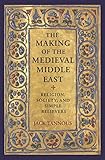The making of the medieval Middle East : religion, society, and simple believers / Jack Tannous.
Material type: TextPublication details: Princeton Princeton University Press 2018Description: xiv, 647 pages : maps ; 25 cmISBN:
TextPublication details: Princeton Princeton University Press 2018Description: xiv, 647 pages : maps ; 25 cmISBN: - 9780691179094
- 0691179093
- BL 1060 TAN 23
- BL1060 TAN .T36 2018
| Item type | Current library | Collection | Call number | Status | Notes | Date due | Barcode | Item holds | |
|---|---|---|---|---|---|---|---|---|---|
 Books
Books
|
CISA Library General Stacks | BL<br>Religions. Mythology. Rationalism | BL 1060 TAN (Browse shelf(Opens below)) | Available | Donated by Fr. Daniel Madigan SJ, | 109481 |
Includes bibliographical references (pages 541-619) and index.
Theological Speculation and Theological Literacy -- The Simple and the Learned -- 'Confusion in the Land' -- Contested Truths -- Power in Heaven and on Earth -- Competition, Schools, and Qenneshre -- Education and Community Formation -- Continuities: Personal and Institutional -- A House with Many Mansions -- A Religion with a Thousand Faces -- Joining (and Leaving) a Muslim Minority -- Conversion and the Simple: the More Things to Change, the More They Stay the Same -- Finding Their Way: the Mosque in the Shadow of the Church -- Rubbing Shoulders: a Shared World -- Dark Matter and the History of the Middle East.
In the second half of the first millennium CE, the Christian Middle East fractured irreparably into competing churches and Arabs conquered the region, setting in motion a process that would lead to its eventual conversion to Islam. Jack Tannous argues that key to understanding these dramatic religious transformations are ordinary religious believers, often called "the simple" in late antique and medieval sources. Largely agrarian and illiterate, these Christians outnumbered Muslims well into the era of the Crusades, and yet they have typically been invisible in our understanding of the Middle East's history. What did it mean for Christian communities to break apart over theological disagreements that most people could not understand? How does our view of the rise of Islam change if we take seriously the fact that Muslims remained a demographic minority for much of the Middle Ages? In addressing these and other questions, Tannous provides a sweeping reinterpretation of the religious history of the medieval Middle East. This provocative book draws on a wealth of Greek, Syriac, and Arabic sources to recast these conquered lands as largely Christian ones whose growing Muslim populations are properly understood as converting away from and in competition with the non-Muslim communities around them. --
There are no comments on this title.

